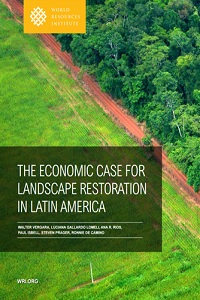Focal point
Location
World Resources Institute
The World Resources Institute is a global environmental think tank that goes beyond research to put ideas into action. We work with governments, companies, and civil society to build solutions to urgent environmental challenges. WRI’s transformative ideas protect the earth and promote development because sustainability is essential to meeting human needs and fulfilling human aspirations in the future.
WRI spurs progress by providing practical strategies for change and effective tools to implement them. We measure our success in the form of new policies, products, and practices that shift the ways governments work, companies operate, and people act.
We operate globally because today’s problems know no boundaries. We are avid communicators because people everywhere are inspired by ideas, empowered by knowledge, and moved to change by greater understanding. We provide innovative paths to a sustainable planet through work that is accurate, fair, and independent.
Resources
Displaying 31 - 35 of 94Confronting the Urban Housing Crisis in the Global South: Adequate, Secure, and Affordable Housing
- There is an accute lack of well-located urban housing that is adequate, secure, and affordable. The global affordable housing gap is currently estimated at 330 million urban households and is forecast to grow by more than 30 percent to 440 million households, or 1.6. billion people, by 2025.
Logging, Mining, And Agricultural Concessions Data Transparency: A Survey Of 14 Forested Countries
Global demand for timber, agricultural commodities, and extractives is a significant driver of deforestation worldwide. Transparent land-concessions data for these large-scale commercial activities are essential to understand drivers of forest loss, monitor environmental impacts of ongoing activities, and ensure efficient and sustainable allocation of land.
Logging, Mining, And Agricultural Concessions Data Transparency: A Survey Of 14 Forested Countries
Global demand for timber, agricultural commodities, and extractives is a significant driver of deforestation worldwide. Transparent land-concessions data for these large-scale commercial activities are essential to understand drivers of forest loss, monitor environmental impacts of ongoing activities, and ensure efficient and sustainable allocation of land.
Climate Benefits, Tenure Costs.The Economic Case For Securing Indigenous Land Rights in the Amazon
A large number of countries recognize the role of forests in carbon sequestration and committed in their NDCs to protect forests, reduce deforestation rates, and restore forestlands. Few NDCs, however, make any specific commitments to how their forests will be protected or restored on degraded land. It is still unclear if governments will protect forests by expanding the protected estate, improving the management of existing national parks, helping communities safeguard the forests on their lands, or by taking other measures.
The Economic Case for Landscape Restoration in Latin America
Degraded lands—lands that have lost some degree of their natural productivity through human activity—account for over 20 percent of forest and agricultural lands in Latin America and the Caribbean. Some 300 million hectares of the region’s forests are considered degraded, and about 350 million hectares are now classified as deforested. The agriculture and forestry sectors are growing and exerting great pressure on natural areas. With the region expected to play an increasingly important role in global food security, this pressure will continue to ratchet up.









